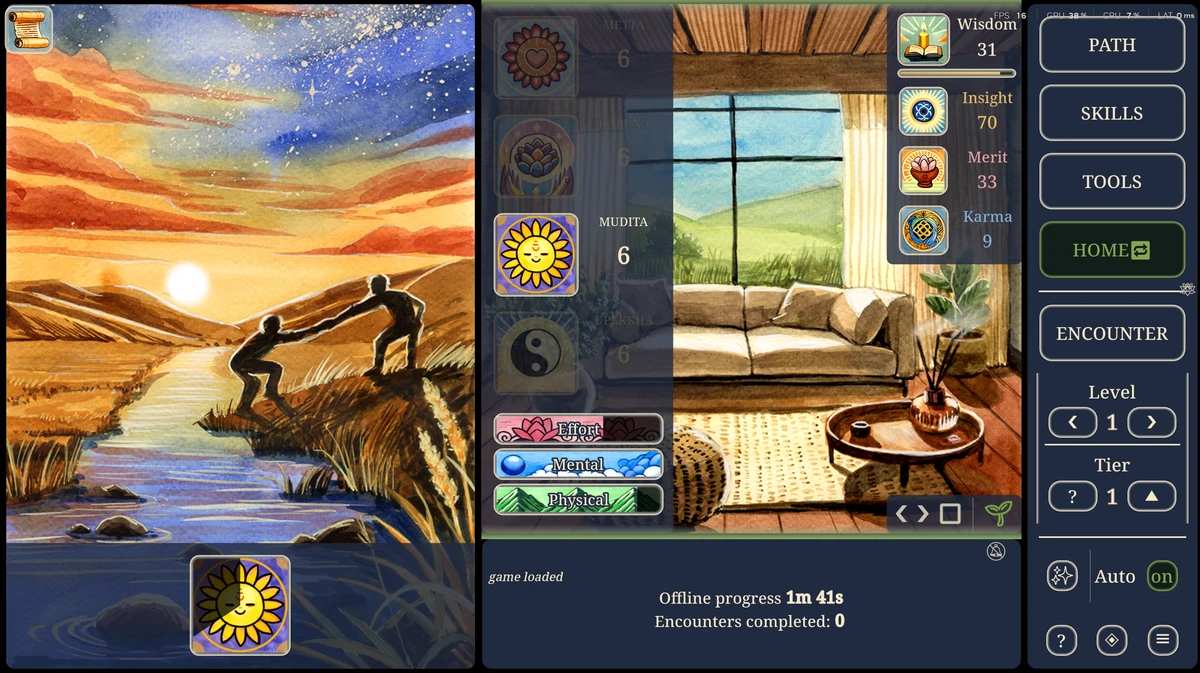Four Divine Abidings combines relaxing gameplay with spiritual exploration, featuring beautiful hand-painted graphics. This meditative experience is based on the philosophical book "Buddhadhamma: The Laws of Nature and Their Benefits to Life." It encourages players to be mindful as they play at their own pace with the game's gentle mechanics.
Thai monk P. A. Payutto wrote "Buddhadhamma: The Laws of Nature and Their Benefits to Life." It is known for its clear explanation of the main Buddhist ideas and its scholarly approach, which connects traditional Buddhist teachings to modern problems while staying true to the teachings. The work serves as both an introduction for newcomers and a comprehensive reference for those familiar with Buddhism.
Four Divine Abidings attempts to gamify these core concepts in a relaxing idle clicker. The goal of the game is to complete the path to full liberation. For those unaware, the title of the game refers to the four virtuous mental states or attitudes in Buddhist teaching: loving-kindness (Metta), Compassion (Karuna), Empathetic joy (Mudita), and Equanimity (Upekkha). There are three stats: Effort, Mental, and Physical which are idly acquired but can be sped up with occasional clicking. These stats are used to complete Encounters, which raise the four divine abiding stats. All of these combine to build up Wisdom, which is used to acquire different skills and tools. The game requires patience and is intended to be completed over multiple weeks.

Mindfulness
Four Divine Abidings successfully introduces the core concepts of Buddhism as P.A. Payutto did before. The game is a relaxing and educational experience that I hope players can reflect on. It not only educates players but also encourages real-world mindfulness with dozens of lore passages, relaxing music, and, most notably, the artwork. The game features an incredible display of hand-painted backdrops inspired by many aspects of Buddhism. They are revealed in an intentional order starting with paintings that display acts of kindness, letting go, and nature. They later begin to reveal tones of awareness, freedom, and solitude. It was definitely a highlight of my experience.
Gameplay Mechanics
Four Divine Abidings is different from other idle games because its mechanics are like the spiritual journey it represents. This game is different from most in its genre because it embraces slowness as a feature. Most games in this genre focus on quick progress and constant stimulation. Every part of the game makes players think about the process instead of focusing on the results.
The Encounter system offers players time where they are encouraged to connect deeply with nature. It's a moment of stillness to reflect on the lessons of impermanence, patience, and harmony. As these encounters are completed, you gain Wisdom, and later, Insight, Merit, and Karma, which can be used to acquire skills and tools. The wisdom accumulation system illustrates the gradual process of spiritual growth through consistent practice, as opposed to sudden breakthroughs. The game takes a multi-faceted approach to the idle genre. It was designed for both an 'active' and 'idle' playstyle, and different skills appease individual styles.
The Rebirth mechanics deserve special mention for how they transform what could be a simple prestige system into a meaningful representation of spiritual progress across multiple lifetimes. Each cycle brings new tools to help progress faster.

Accessibility and Audience
One of the more impressive characteristics of Four Divine Abidings is how it makes hard-to-understand Buddhist ideas easier to digest. Players with limited prior knowledge of Buddhism can learn these lessons over time, and people who do know a lot about it will appreciate how accurate the game is.
The game's unhurried pace and non-competitive nature make it a very welcoming experience. There is no "wrong" way to play, and you can use the respec system frequently if you feel you made a mistake. This philosophy aligns perfectly with the Buddhist teachings. I know many people will find the game too passive, especially compared to modern games that prioritize quick stimulation, but they would be missing the point.
The tutorial provides the needed context, but I did feel the game was a bit overwhelming at the start. There's a lot of terminology not typically seen in games and some wording that overlaps with more common gaming words, such as "encounters." I appreciated the rare balance between education and entertainment in games.
Development
The game was developed by a very small team of clearly passionate developers. It was purposely released on Steam for free with no monetization strategy. The developer expressed the need in the world for people to unlock unique experiences free from financial constraints. The Steam page features an optional $4.99 support package to help development.
The game is available on both Windows and Linux and works well on the Steam Deck. I appreciate the game's tolerant licensing and use of free and open-source tools such as the game engine, Godot, and various assets such as the fonts. I also appreciate the limited resource requirements and the extremely quick loading time.
You can play this for free or optionally support them on Steam.

Conclusion
Four Divine Abidings will not appeal to everyone, but it does offer something valuable that most games fail to do. It provides a place to think, grow, and relax. This way of playing games feels new to me but also necessary in our chaotic world. The journey towards Full Liberation rewards players that go beyond the game and are willing to embrace its slow, mindful pace.

